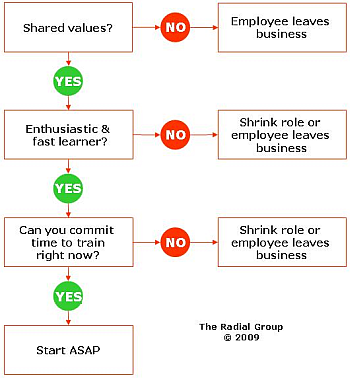The health club general manager. The personal trainer. The wellness director. The health coach. When they fall short, how do you decide whether to fire them — or put them on a performance plan?
Maybe they don’t have the skills to work with customers with diabetes or chronic back problems. Maybe their nutrition knowledge is out of date. Maybe their personal training skills are sub-par. Maybe they know their subject-matter cold, but miss the boat on customer service.
Should you train them? Or fire them?
While the conversations may be stomach-churning, the process for making this decision is actually pretty simple:
The “Train or Terminate” Decision Tree
Step 1: Does this employee share your values?
Examples of values which are frequently important in health and wellness businesses include integrity, an appreciation for knowledge, and respect for customers’ time and money. Other important values often include reliability and consistency of performance and temperament.
To answer this question, examine how your employee’s actually handled challenging situations in your business. Focus on what they DO, not what they say. Plenty of people say the right things but don’t actually walk the talk in real life.
Values can’t be taught. They’re either in the employee’s DNA, or they aren’t.
If an honest evaluation leads you to conclude that you and your employee don’t share the same values, it’s time to transition them out of your business.
Let’s say they’ve got great values, and consider the next question:
Step 2: Is this employee an enthusiastic and fast learner?
While you can’t teach values, you CAN teach “subject matter” to smart, energetic people who simply lack the knowledge and learning that study and experience bring.
However, if they’re just not that smart – you have to explain things repeatedly, and they never catch on quickly to anything new – you’re investing in the wrong person. You’ll either need to shrink their role or have them leave your employment.
And if they lack a sense of urgency, they won’t make it a point to master the new material and improve their performance quickly enough to do your business any good. Again, you’ll need to reduce their role and your expectations for them, or have them leave your business.
Let’s say they are indeed energetic, quick learners.
Now ask yourself:
Step 3: Can your business afford the time to develop them right now?
If the answer is yes, treat the training process like a project. Otherwise, it’ll never happen. She’ll always underperform, and your business results will suffer.
Consciously set aside part of your schedule and hers each week to spend on training. Make a list with a timeline of the key concepts and knowledge that you want to teach her. For each concept, decide how you’ll measure her level of mastery.
If other staffers will help train her, have them set aside specifically-scheduled time and identify specifically what and when they will teach her.
If you can’t commit the time to train her, then you need to either plan on a reduced role with lower expectations for these employees, or have them leave the business.
The bottom-line:
If they don’t share your values – and they aren’t excited and capable of learning – why would you want them in your business?
If they share your values, but can’t learn quickly, why would you want to penalize your business, staff and clients?
And if they’re great – but you flat-out can’t commit the time to train them – isn’t the best answer to be honest with yourself and them about that fact?





